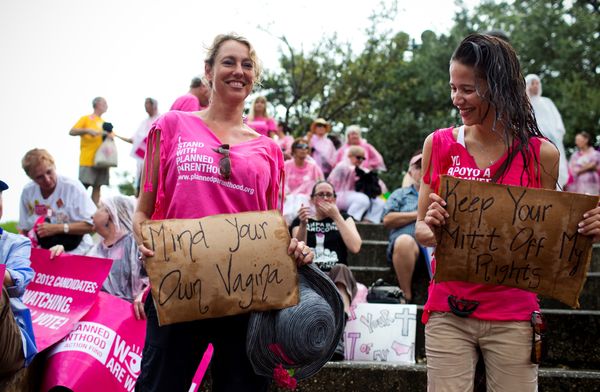Many Americans, world leaders, and dignitaries paid their last respects to former President George H.W Bush on December 5th, and I am not ashamed to say that I wasn't one of them.
Like most of you, I was taught that if I didn't have anything nice to say, I should just keep my damn mouth shut, but then again, where is the fun in that?
Throughout the day, I caught snippets of the service televised from inside the National Cathedral in Washington, and I was arbitrary, to say the least. It was a nice service, I mean if you enjoy classical hymn's, unfunny anecdotes and an orange president in the front row, but it was also prevaricating.
H.W Bush was described as "close to perfect," by his son, and many others spoke on the late-president as a dignified leader who led with courage, honor, and integrity. And I am sure he encompassed all of those traits---to somebody, but I can't help but not think of his arduous legacy on the topic of race. And somebody needs to critique his infamous way of doing politics and the nasty, fear-mongering way he won his presidency in the first place.
The former President had a political career that encompassed the decades surrounding the Jim Crow era and the civil rights movement, respectively. The political arena shifted, and it was the first time in American political history where it actually mattered were you morally fell in regards to race. You were either racist, or you weren't. And to keep it simple, I'm not talking about covert or institutional racism (yet.) I'm referring to overt, release the hounds, open the fire hose, bomb the church, beat 'em, tie 'em to a fan and drown 'em, shoot him in the head, strange fruit racism. And President H.W Bush seemed to ride that line throughout his political career.
On one hand, he would vote in favor of the 1968 fair housing act, openly denounce the Ku Klux Klan and its former leader, and appoint Colin Powell, as the first black Secretary of State. But none of that leaves us sure of his view on black people as he has also opposed civil rights legislation, referred to his own (half Mexican) grandchildren as "the brown ones," and put that troll of a man, Clarence Thomas on the Supreme Court.
But nothing said, "piece of sh..." like his strategy of subtle stereotyping, playing on suspicion, fear and group-based guilt.
Bust got elected president after a campaign sullied by the egregious Willie Norton ad, about a black who murdered a white woman during a temporary release from prison.
Now, what we are not going to do is pretend not to see the stereotypical and damaging narrative of the big scary black guy, and the poor innocent white women being used to further a political and capitalist agenda.
While Bush's campaign did not actually release the ad, and it instead came from a third-party group, Bush absolutely exploited its influence as well as the image of "the dangerous black man." His 1988 campaign ran on his "touch on crime" stance, and he absolutely took advantage of the ad's effectiveness---as opposed to condemning it.
While the "purpose" of the ad was to criticize opponent, Michael Dukakis,' lax stance on crime, and support of furlough programs, many, including myself, would argue that if this was the true nature of the ad, and not to exploit the image of "the black man," why not run the ad without the face of Willie Norton? Wouldn't it have conveyed the same message?



















